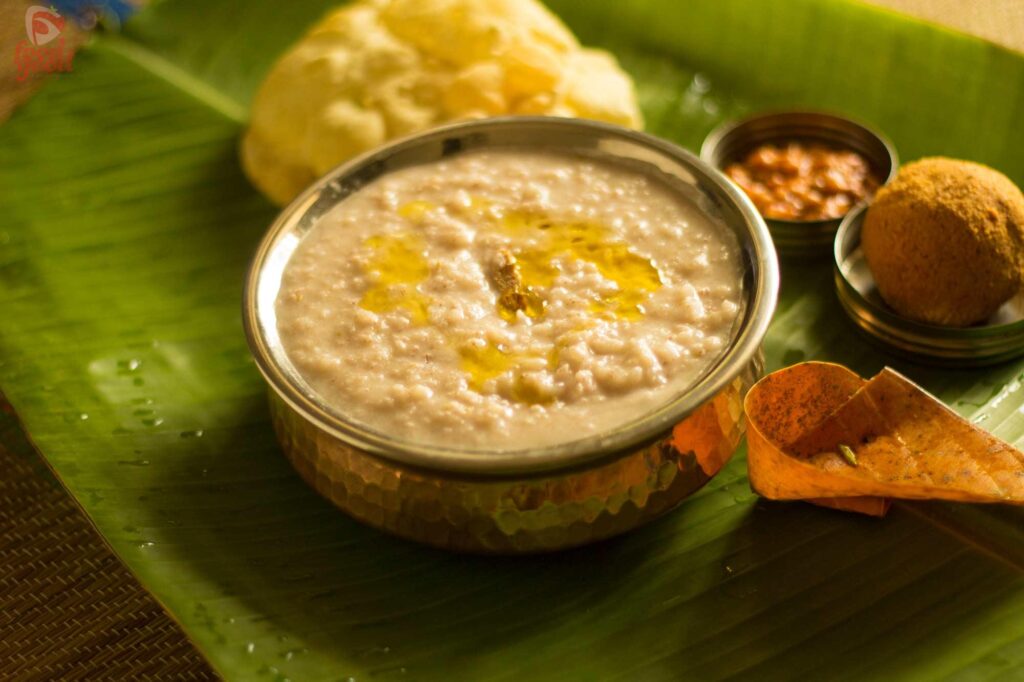Palkanji is a centuries-old traditional breakfast dish from Kerala, often referred to as the royal breakfast of the region. This humble yet nourishing porridge once graced the breakfast tables of kings and nobles, long before popular dishes like idli and dosa became part of the daily menu. In those earlier times, porridge or kanji was the staple breakfast in most households. Palkanji, infused with the richness of coconut milk and fragrant spices, was considered a more refined and luxurious version of the everyday congee.
Origin of Pal Kanji
The origins of Palkanji date back to a time when simple, wholesome meals were the norm. For the elite, plain rice porridge was often elevated with freshly grated coconut, coconut milk, cumin seeds, and ghee, creating a dish that was both comforting and indulgent. The term “Palkanji” literally translates to “milk porridge” in Malayalam, though in this context, it typically refers to coconut milk rather than dairy.
Preparing Palkanji is simple, requiring minimal ingredients yet delivering a deeply satisfying result. Traditionally, raw or red matta rice is cooked in water until it reaches a soft, slightly mushy consistency. Once the rice is well-cooked, freshly grated coconut crushed with cumin seeds and a pinch of salt is added to the pot. Some versions replace grated coconut with fresh coconut milk, which gives the porridge a smoother, silkier texture. A touch of dry ginger powder, known as chukku in Malayalam, is often added to enhance the flavor and aid digestion. The porridge is simmered gently until it thickens slightly, achieving a consistency that is neither too watery nor too heavy. A drizzle of ghee over the hot porridge just before serving adds a fragrant richness that ties everything together.
Side Dish For Pal Kanji
Palkanji is typically enjoyed with simple side dishes that complement its creamy base. Though it is delicious on its own, it is often served with ghee, which enhances its flavor and texture. Traditional accompaniments include tangy pickles, creamy coconut chutney, crispy pappadam, or a mild green gram stir-fry. These additions create a balanced meal that is both comforting and nutritious.
Beyond its culinary charm, Palkanji is also appreciated for its health benefits. It is easy to digest, hydrating, and full of natural goodness from rice and coconut. Its mild nature makes it suitable for all age groups. In fact, it is often one of the first solid foods introduced to babies in Kerala, sometimes given to infants as young as six months. The combination of soft rice and coconut is gentle on the stomach, making it a preferred choice during illness, recovery, or simply when seeking a light, wholesome meal.
For many Malayalees, Palkanji remains a bowl of comfort — a reminder of traditional kitchens, childhood memories, and slow, peaceful mornings. It’s my personal comfort breakfast, something I can enjoy any day, no matter the season or mood. If you’ve never tried it before, I encourage you to give it a go. With its simplicity, warmth, and timeless flavor, Palkanji is sure to win your heart.
Kerala Palkanji
Ingredients
Instructions
-
Crush the dried ginger and keep it aside.
-
Boil water in a pot - just enough to cook the rice.
-
When the water starts boiling, add the rice and cardamom seeds.
-
While the rice is cooking, grind grated coconut and cumin seeds into a thick paste using enough water.
-
(Alternatively, you can use coconut milk. If using coconut milk, crush cumin seeds separately and add them later.)
-
When the rice is fully cooked, add the coconut mixture (or coconut milk with crushed cumin seeds).
-
Let it simmer for a few minutes. The consistency should be slightly thick, not watery.
-
Add salt to taste and mix well.
-
Serve hot, topped with a teaspoon of ghee or paired with coconut chutney for a healthy and comforting breakfast.


